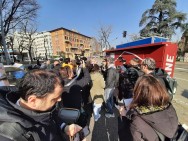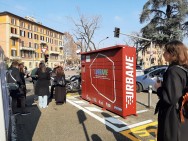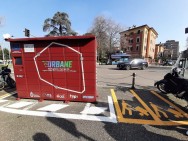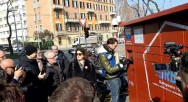- Home
- International relations and projects
- URBANE project. Automated micro hubs installed in the historic center
URBANE project. Automated micro hubs installed in the historic center
Bologna kicks off the pilot project for the sustainable and collaborative delivery of goods in its historic center, with the installation of 3 automated micro hubs for the transfer of goods from traditional vans to electric vehicles. They consist of proximity logistics spaces, envisaged by the Urban Plan for Sustainable Mobility (PUMS), located in strategic areas of the city close to the historic center.
Starting from February 12, the transporters, who are also partners in the project, will deliver the goods to the micro hubs which will then be sorted and distributed in the urban center by a last-mile operator using eco-sustainable vehicles. The main objective is to implement a sustainable, innovative and low environmental impact goods delivery system in urban areas, considering that the last mile of deliveries is the part of the process with the highest emissions intensity.
The experimentation is part of the URBANE project for sustainable logistics, financed by the European Union's Horizon Europe Framework Program for research and innovation, through which the Municipality intends to enhance the role of the city in implementing the objectives of the 2030 Agenda for the green transformation and in participation in the Mission 100 cities with zero climate impact by 2030.
The city of Bologna is one of the four Lighthouse Living Labs involved in the project together with the cities of Helsinki, Thessaloniki and Valladolid.
The local partnership is made up of the Municipality of Bologna, ITL – Institute for Transport and Logistics; GEL Proximity; Due Torri S.p.a and TYP.
In addition to the partners, 2 other important stakeholders are actively involved in the project: Salerno Trasporti S.r.l, with the role of last miler, and Ricoh Italia, provider of smart services and technologies which, in partnership with Wib, is the supplier of automated micro hubs.
The experiment, also supported by the Metropolitan City of Bologna through the MOVE21 Project, involves the movement of approximately 100 parcels per day. In addition to the local consortium, the project involves strong collaboration with the other 35 project partners, some of which will create further innovative systems to support the living lab, such as a digital twin and a blockchain system.
Ultimo aggiornamento: mercoledì 14 febbraio 2024









